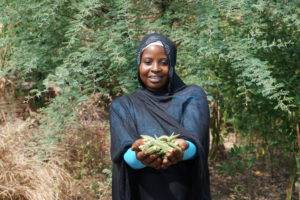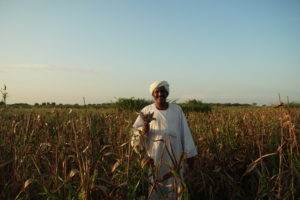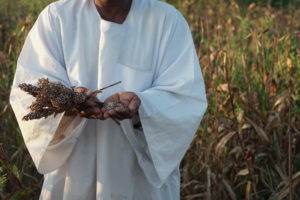When climate change collides with the shock of social upheaval, the result is a perfect storm of disruption, poverty and conflict. For the people of Blue Nile state, Sudan, this has been their reality since the turn of the century.
From the shadow of conflict and the growing climate crisis, springs new hope. We’re helping people to build long–term resilience by addressing underlying issues around poverty and vulnerability, as well as helping them adapt to the changing climate.

With the right support, knowledge and tools, people like Kalisha can earn a living from the land and look forward to a more settled and prosperous future.
Three civil wars in Blue Nile State have caused mass internal displacement and migration. Host communities have to share farming land. Pastoral communities have seen migratory routes reduced as displaced people start farming on previously unused land.
In addition, thousands of people have been forced to leave their homes and relocate to new purpose-built villages as the Government constructed a huge hydro-electric dam.
Whilst this has brought some new education and health care opportunities, it has meant people have been forced to farm new, less fertile, land. In addition, their water sources are much further away and traditional fishing practices are no longer viable.
Furthermore, climate change is biting, manifested in periods of drought interspersed with devastating bouts of heavy rain. Deluges wash away crops. Displaced people are forced to farm on the least productive land, starting from scratch with no seeds or tools.
Some people have fallen sick as a result of cholera outbreaks. At other times of the year, drought conditions cause tension between pastoral communities and farming communities as they are forced to use the same parched, overworked land for their different purposes.
A community on the edge of survival
Farmer, Alzain Mohamed Ali, 57, described the situation in Yarwa village before Practical Action and our partners arrived.
He said: “Three years ago, because of the conflict, there were a lot of displaced people in the area. We didn’t have enough resources.
“Very often the mothers were not well fed. Most of them were very poor and they never feel full of food. If the mother is not well fed then the children will not be well. The displaced people had left everything and came by themselves so they are definitely the poorest members of the village. That is why we have given them some land but they are definitely worse off.
“The health centre was too small and there wasn’t enough clean water for everyone.
“Even though we welcomed them and shared our lands with them there was a lot of flooding.
“This year has been very bad. It started raining in May and it is still raining now (at the beginning of November).
“It affects the production of the crops. Some of them don’t need so much water and they flood.
“For the past couple of years loss of production was at around 50% and we had enough produce to cover ourselves, but this last year we had a 100% loss. The sorghum and millet grows outside and that was totally lost so we had nothing to sell.
“I had to do other labour work. We had to harvest from other farmlands and get paid for that.
“All the villages around here and the people here are suffering the same problem. Everyone comes to this village to use the services we have here.
“The combination of flooding and war was terrible here for five years. It stopped full crop production so even people who were well off lost everything because they were investing but not getting anything in return.”
When ‘normal’ just won’t cut it

Harvests have been increasing for Alzain since we helped him get a loan so he could invest in his farming business, and training on profitable, planet-friendly farming techniques.
An extreme situation like this calls for solutions that are anything but normal. In other words, it needs a very Practical Action approach.
These are complex problems and they need, not just a multi-pronged approach to solving them, but a new way of working entirely. Our team in Sudan have been able to respond. For the first time in Blue Nile, there is a co-ordinated response to the needs of the region under a single project. Together, international and local NGOs use an array of expertise which has been proven to work in similar contexts elsewhere.
This consortium is managed and co-ordinated by Practical Action from the state capital El Demazine. The consortium acts as the broker and manager. Were appropriate, it delivers the work as well.
These are the elements of our approach:
- New health centres, offering local and displaced people both nutrition advice and emergency food.
- Support with livelihoods, teaching women food processing and business skills.
- Access to microfinance to buy transportation to get goods to markets, supply loan boats and enable shops and new businesses to invest.
- Training for new agrovets to improve animal health.
- Sustainable farming knowledge, helping people grow crops better suited to the new climate reality and learn techniques to retain water and grow marketable crops in gardens.
- Rehabilitating hafirs – artificially constructed catchment basins – which provide vital sources of water for animals for pastoral communities and for farmers for irrigation.
- Access to clean gas stoves, enabling women to avoid the appalling effects of cooking over open fires on their health and to launch small start-up cooking businesses.
- Public toilet and washing blocks to help reduce incidents of diarrhoea and sickness.
New hope for farmers
In a region where people have had to deal with social and climate shocks, the effect of the combinations were dramatic.
Take Yousuf Omer, a 42-year-old from Medina 6, a former farming village which had been moved into a very different environment where people have struggled to grow traditional crops in new soils and with less certain weather patterns.
Practical Action has been working in the village to help set up a loan fund so that people are able to save and invest in tools and seeds. Our staff have also worked with the women’s development network to set up an investment fund for clean cooking solutions. Some of the women that have benefited from that have started small businesses cooking biscuits and other food which they are able to sell.
Yousuf told me “My wife started making biscuits and that really helps us with the household expenses. It also helps us cut costs and plan forwards.

Seeds that are suited to the changing weather and soil conditions are a vital part of the puzzle to help farmers like Yousef improve their harvests.
“There are five other people who have done something similar that I know of. It has really improved our lives and other men have come to me and said they really want their wives to be involved in this.
“I am also a committee member in the village savings and loan scheme. We pay 200SDGs per month and we have so far saved 7,000SDGs as a group.
“We need to keep this money going. Recently we have given it to the grocery shop owner so he can invest in more food. That allows us all to buy more goods for the whole community and he has already paid back two installments.
“Things are still difficult here. Water access is still very poor. It takes us one and a half hours to walk to the Nile and the water is not even very clean. Drinking water is the main issue.
“Most of us are farmers here but we don’t have enough money to buy tools. We farm during the rainy season and the winter and the irrigation we have to do ourselves by hand.
“It has had a good side and a bad side. Before we planted crops and we grew everything we needed. When I came here the environment was completely different. We couldn’t do farming in the way we used to do it. Here if we want anything we need to have money and most people here simply don’t have any.
“However there are good things too. We have a health centre and a mosque now. Most people never used to be able to send their kids to school, but now there is one in the village.
“So I don’t mind being here, but I just want us to be able to sort out our problems.
“So far everything that has been done has been really good. The solutions that we have got will give us the chance to grow more and sell things. The savings and loan has a really big potential for good.”
When climate change and conflict collide, the result can be catastrophic. We’ve proven that it’s possible to build long-term resilience by focusing on the fundamental problems that cause poverty and vulnerability. The result is a resilient community, able to step out of the shadow of conflict into a future of peace and prosperity.